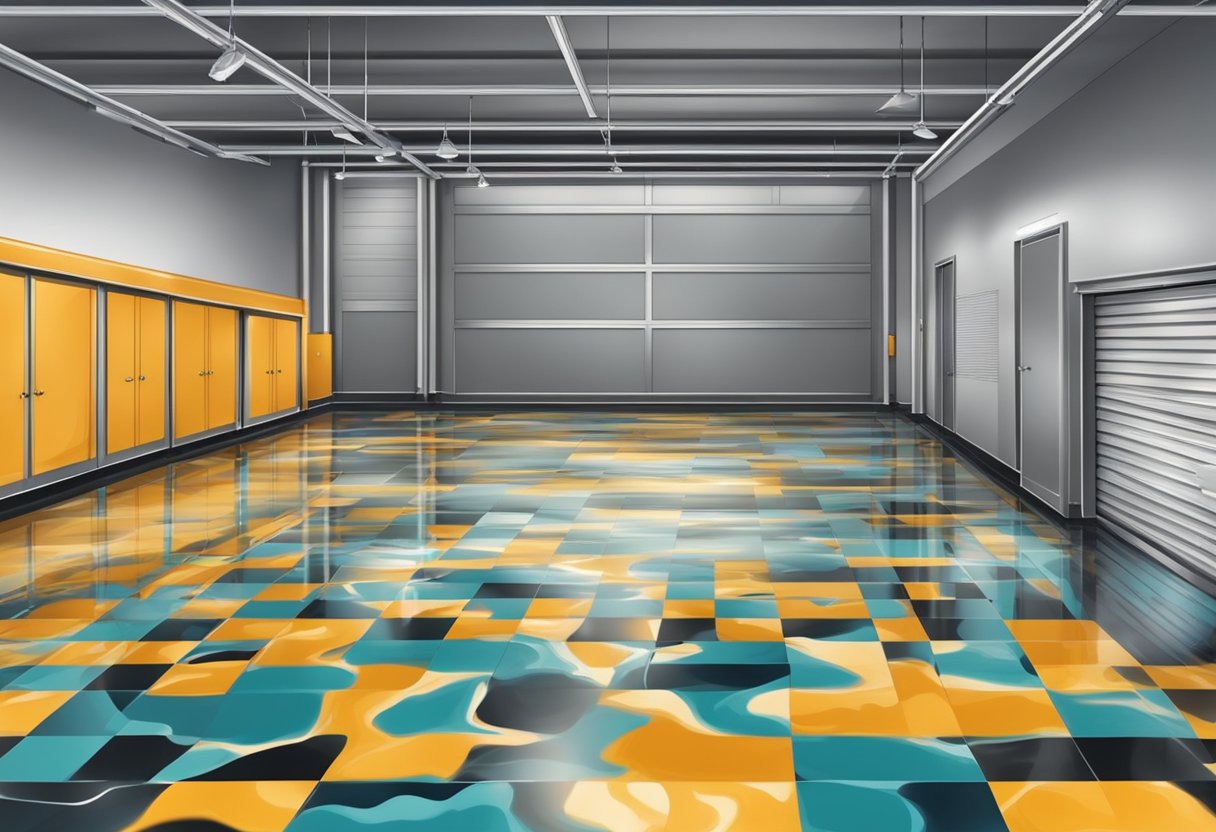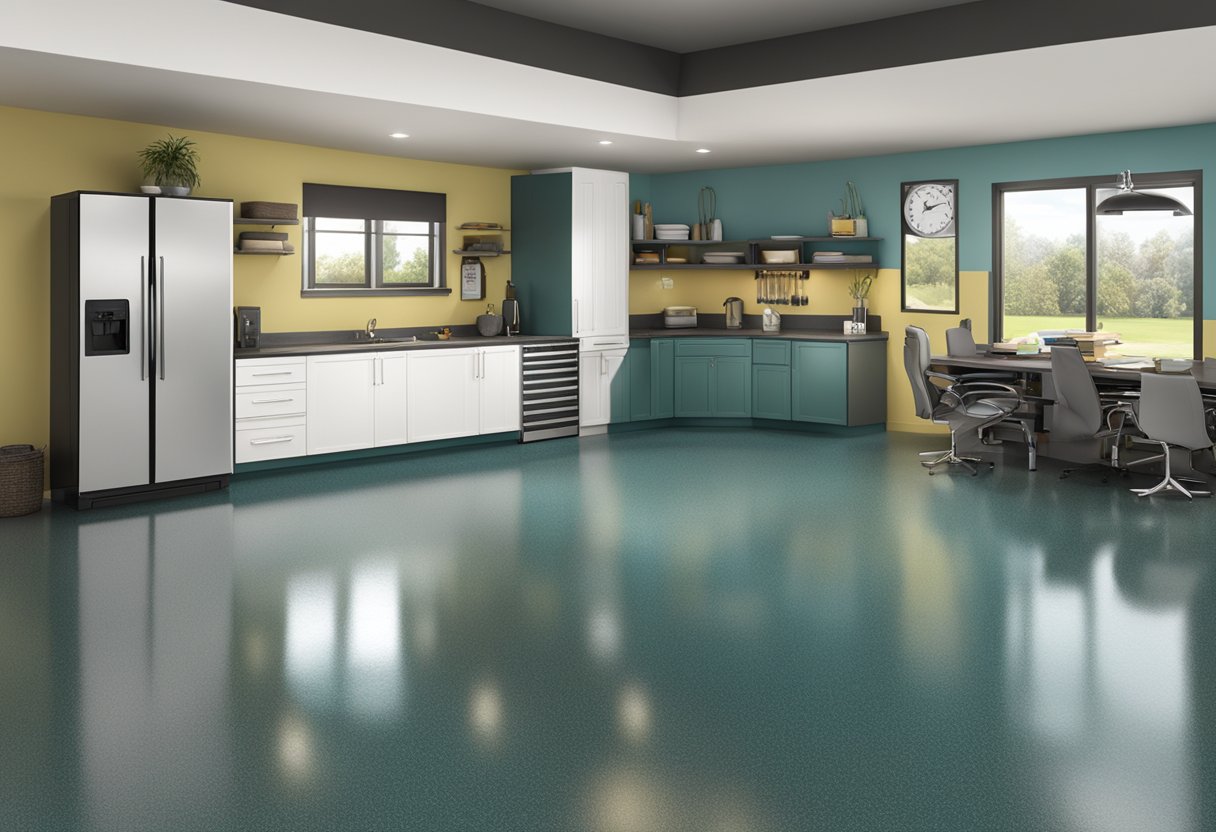Garage floor epoxy provides a durable and long-lasting solution for protecting and enhancing the appearance of a concrete garage floor. These coatings are specially formulated to resist water, chemicals, and abrasion, ensuring that the floor remains in excellent condition despite heavy use and exposure to harsh conditions. Moreover, with various colors and finishes available, garage floor epoxy can also transform the appearance of a dull concrete floor into an attractive, functional space that complements the overall design of the area.

To achieve the best results, it is essential to choose the right garage floor epoxy for your specific needs and follow proper preparation steps before application. From selecting the appropriate type of epoxy to considering factors like color, finish, and maintenance requirements, homeowners should weigh the various aspects before making a decision. Ultimately, a well-applied epoxy coating can significantly improve the appearance, performance, and lifespan of a garage floor, offering both aesthetic appeal and practical benefits.
Key Takeaways
- Garage floor epoxy offers durability and protection to concrete surfaces.
- Selecting the right epoxy and adhering to proper preparation is crucial for best results.
- Customizable colors and finishes allow homeowners to create a functional and attractive garage floor.
What is Garage Floor Epoxy
Garage floor epoxy is a durable and long-lasting coating that transforms ordinary concrete floors into heavy-duty, easy-to-clean surfaces. This high-quality flooring solution is designed to withstand daily wear and tear, making it an ideal choice for residential and commercial garages, workshops, and other high-traffic spaces.
The primary attribute of garage floor epoxy is its durability. This heavy-duty flooring system creates a strong bond with the concrete surface, resulting in excellent resistance to abrasions, chemicals, and impacts. As such, it can maintain its integrity for years to come, even when subjected to tough conditions, such as heavy machinery, spills, and frequent foot traffic.
In addition to its strength, garage floor epoxy also offers a high-gloss finish. This shiny and attractive surface not only enhances the overall appearance of the space but also improves visibility, making it safer to navigate. Furthermore, the sleek, seamless nature of the epoxy coating helps to repel dirt, dust, and liquids, simplifying routine maintenance and ensuring a cleaner environment.
One key advantage of choosing garage floor epoxy over other flooring options is its relatively quick and straightforward installation process. Professionals can apply the epoxy coating directly onto the prepared concrete surface, reducing downtime and minimizing disruptions. Once the coating has cured, which usually takes 24 to 72 hours, the new epoxy floor is ready to use.
In summary, garage floor epoxy is a solid investment for those seeking a durable finish with an attractive, high-gloss appearance. Its ability to withstand harsh conditions, coupled with its ease of installation and maintenance, makes it an ideal choice for various environments, particularly those that demand a heavy-duty flooring solution.
Choosing the Right Garage Floor Epoxy
When searching for the perfect garage floor epoxy, it’s important to consider various factors to ensure a long-lasting and durable finish. The right product should not only enhance the appearance of the garage but also offer reliable protection against chemicals, abrasion, and impact.
Firstly, prioritize quality over affordability. There are several low-priced products available in the market. However, it’s essential to select a high-quality epoxy that not only meets your requirements but also provides value for money. Top-grade products ensure you won’t need to redo the flooring frequently, saving you time and effort.
Epoxy garage floor coatings generally come in two parts: Part A and Part B. Part A consists of the epoxy resin, and Part B is the hardener or catalyst. When mixed together, they form a robust and durable bond to the concrete surface. Be sure to choose a product that provides clear mixing instructions and application guidelines for the best results.
When determining the appropriate epoxy for your needs, consider the floor’s requirements and usage. For instance, a commercial garage floor may require a heavy-duty, chemical-resistant epoxy, while a residential garage may need a coating with an attractive, slip-resistant finish.
It’s also important to choose an epoxy garage floor coating that offers ease of application. Some epoxy products can be more complex to mix and apply compared to others. User-friendly products that come with well-detailed instructions can make the application process much smoother, especially for DIY enthusiasts.
Lastly, take the curing time into consideration. Some epoxy coatings may take longer to cure and can become a significant inconvenience, especially if the garage is in continual use. Opt for products that have quicker curing times to minimize disruption.
In summary, selecting the right garage floor epoxy involves considering factors such as quality, affordability, ease of application, and curing time. By taking these aspects into account, you’ll be able to find the best epoxy product that ensures a durable, attractive, and functional finish for your garage floor.
How to Prepare Garage Floor Epoxy
Surface Preparation
Before applying epoxy to your garage floor, it is crucial to ensure the concrete surface is clean and in good condition. Start by inspecting the floor for cracks, oil stains, grease, and stains. If there are any cracks, repair them using epoxy filler. For oil stains or grease, use a degreaser or concrete cleaner to remove them.
Next, sweep the entire floor with a broom to remove dirt and debris. Once the floor is clean, one key step is to etch the concrete using a concrete etch solution. This will help roughen the surface, providing better adhesion for the epoxy coating. Rinse the floor thoroughly with water after etching, and allow it to dry completely.
Mixing and Applying Epoxy
After preparing the surface, it’s time to mix and apply the garage floor epoxy. Follow the manufacturer’s instructions regarding the mixing ratio of epoxy resin and hardener. It is essential to mix the components accurately for proper curing and adhesion.
Once mixed, start applying epoxy using a roller or brush, working in small sections to ensure even coverage. Be careful not to apply the epoxy too thick, as this can cause issues during the curing process. After covering the entire floor, use a spiked roller or squeegee to help level the epoxy and release any trapped air bubbles.
Curing and Drying Time
The final step in preparing your garage floor epoxy is allowing it to cure and dry properly. Generally, epoxy requires a minimum of 24 hours before it is safe to walk on and at least 48-72 hours of curing time for vehicle traffic. However, check the manufacturer’s instructions for specific curing times.
Throughout the curing process, maintain a consistent temperature and avoid exposing the floor to moisture or harsh chemicals. Remember, patience is key in achieving a long-lasting and durable epoxy garage floor.
Epoxy Garage Floor Colors and Finishes

Epoxy garage floor coatings offer a variety of color options and finishes to suit any homeowner’s aesthetic preferences and functional needs. When choosing the right color for an epoxy garage floor, homeowners can opt for classic shades such as white, black, or various shades of gray. These neutral colors are popular choices for garage floors, as they provide a clean, professional appearance and help to mask dirt and stains.
In addition to neutral colors, epoxy garage floor coatings also come in a range of other vibrant and attractive colors. This allows homeowners to customize their garage space to match their personality or coordinate with the rest of their home. Selecting the right color can also help improve the overall environment of the garage, making it a more inviting and pleasant space to work or spend time in.
The finish of an epoxy garage floor is another essential factor to consider. A high-gloss finish can elevate the look of a garage space, as it adds a clear, high-gloss topcoat that enhances the visual appearance of the floor. This type of finish can also improve the durability and longevity of the epoxy coating, providing added protection against wear and tear.
In summary, epoxy garage floor coatings allow homeowners to choose from a wide range of colors, including neutral options like white, black, and shades of gray, to more vibrant and personalized choices. Additionally, a high-gloss finish can further enhance the appearance and durability of the garage floor. With these options, homeowners can create a garage space that is both visually appealing and functional.
Frequently Asked Questions
What type of garage floor coating is best?
The best type of garage floor coating depends on the specific needs and preferences of the homeowner. Garage floor epoxy is a popular choice due to its durability, chemical resistance, and easy maintenance. It provides a strong, protective layer that resists stains, abrasions, and impact damage. There are several types of epoxy coatings that cater to different needs, such as 100% solid epoxy for maximum strength and water-based epoxy for ease of application.
Are there any disadvantages to epoxy flooring?
While epoxy flooring offers numerous benefits, it also has some downsides. The initial cost of epoxy coatings can be quite high, especially for professional installation. Furthermore, epoxy flooring can be slippery when wet, which may pose a safety concern. It is also sensitive to UV light, which can cause the color to fade or yellow over time. Lastly, installing epoxy flooring can be a time-consuming process, typically requiring several days to properly prepare the surface and allow for curing.
How do epoxy flooring colors affect the overall appearance?
The color of epoxy flooring can greatly influence the overall appearance of a garage. Lighter colors can make the space seem larger and brighter, while darker colors may create a more intimate, cozy atmosphere. Additionally, colored flakes and metallic pigments can be added to the epoxy to create a unique, customized look. It’s important to consider how the chosen color will complement the overall design and style of the home.
Which brands offer high-quality garage floor epoxy?
Several well-known brands offer high-quality garage floor epoxy, such as Rust-Oleum, Sherwin-Williams, and Valspar. These companies provide a variety of epoxy formulations and color options to suit different needs and preferences. It’s essential to research and compare different products to find the best fit for a specific garage floor project.
Is epoxy flooring worth the investment for a garage?
Epoxy flooring can be a worthwhile investment for many garage owners due to its durability, low maintenance, and visual appeal. It protects the concrete floor from chemicals, stains, and impact damage, prolonging the life of the garage floor. While the initial cost of epoxy coatings can be high compared to other options, the added protection and long-lasting performance may justify the expense for many homeowners.
How does epoxy compare to concrete for garage floors?
Epoxy and concrete are both common options for garage floors, each with its own benefits and drawbacks. Concrete is a cost-effective and versatile flooring material, but it can be prone to crack, stain, or wear down over time. On the other hand, epoxy creates a more durable and chemically-resistant surface that can withstand daily wear and tear more effectively than untreated concrete. Additionally, epoxy offers a wider range of design and color options, giving homeowners the flexibility to create a customized appearance for their garage floors.
